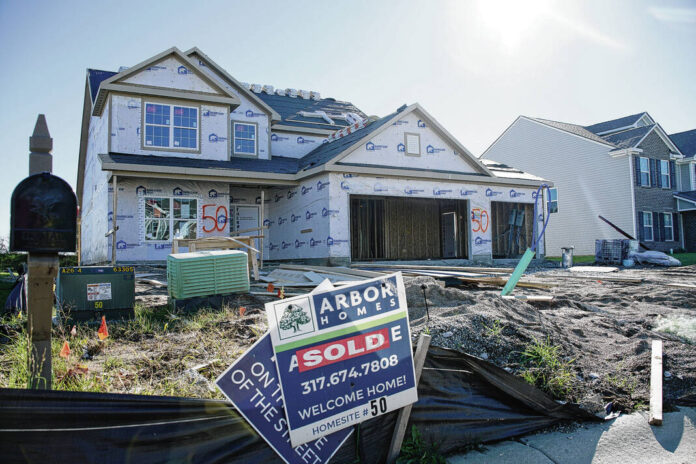Property tax bills arrived in mailboxes in late April, and many homeowners likely saw a big leap in their home’s assessed value for the 2022 fiscal year.
The total residential property assessed value in Johnson County increased by 20% for 2022, according to abstract data from the Johnson County Assessor’s office. The total amount of home values in the county jumped from around $10.4 billion to $12 billion in the last year.
This growth in the assessed value of homes is a direct result of the red-hot real estate market and rising housing prices in Johnson County and central Indiana, said Mark Alexander, county assessor.
“We study one year at a time, but now we’re seeing a pattern really for the last two years,” Alexander said.
Single-family home prices have skyrocketed in the county in the last two years. The median home price in Johnson County hit $280,000 in April, according to data from the MIBOR Realtor Association, the professional organization representing Central Indiana realtors. In April 2021, the median home price was at $250,000 and $213,000 in 2020.
How the assessed value is calculated is set by state law, which requires assessors to follow fair market value, he said.
Since 2002, county assessors have been using the same formula to complete detailed annual market analyses that determine the median selling price in each township and neighborhood. A trending factor is determined based on area sales, and that factor is used to calculate what the home is worth at that moment in time, Alexander said.
A home’s assessed value is then tied directly to how much the homeowner pays in property taxes. That is the “good news, bad news” about assessed value, Alexander said. An increased home value means it can probably be sold for a higher price than before, but it also means higher property taxes.
The tax bills paid each year are also two years behind with the housing market. The 2022 assessed values, which reflect taxes to be paid in 2023, are calculated by the assessor’s office from 2021 house sale price data. Taxes to be paid this year reflect the 2021 assessment, which uses sales data from 2020.
Indiana has a 1% property tax cap on homesteads, meaning a property owner does not pay more than 1% of their homestead’s assessed value each year, unless a tax referendum is passed locally. That means that just because property tax bills are higher, it does not mean there was a tax increase, Alexander said.
“You can generally say, if I have a $200,000 house, then I move a decimal point, and my annual property taxes could not exceed 2,000,” Alexander said.
Unless action is taken by the state legislature, assessed values will continue to rise because of the calculation’s contingency on the housing market, he said. County assessors have been following the same assessment formula for two decades, despite shifts in the housing market.
Alexander has met with local lawmakers Sen. Greg Walker, R-Columbus, Rep. Michelle Davis, R-Whiteland, and Rep. John Young, R-Franklin, to discuss how rising home values are shifting more property tax burden onto homeowners, he said.
“It’s an interesting topic, because it’s so new … my question to them is, did you realize this was going on?” Alexander said. “Once I explained it … they would say, ‘Well, now I do. I hadn’t thought of that.’”
For now though, the best action homeowners can take is appealing their property assessment with the county assessor’s office, Alexander said.
“Step one is to take care of yourself, file a request for review. Go through that due process,” he said.
An appeal begins with filing a Form 130, the “Taxpayer’s Notice to Initiate an Appeal” that can be found on the Johnson County website under the “Assessor” page. The appeal should detail why the assessed value is being disputed.
A local assessing official will meet one-on-one with the property owner and then send a recommendation to either approve or deny the appeal. If its denied, then it would go before the county Property Tax Assessment Board of Appeals.
As of May 20th, 128 appeals had been filed, Alexander said. The deadline to appeal a property assessment is June 15.
AT A GLANCE
How to file a property tax assessment appeal
1. Fill out a Form 130, or an intent to appeal. It can be found on the “Assessor” page on the Johnson County website, or visit the Johnson County Assessor’s Office at 86 W Court St. in Franklin for a hard copy.
2. An appraiser will then meet with you for an informal conference about your property. The appraiser will either approve or deny the appeal then.
3. If the appraiser denies the appeal, it will have a hearing before the Property Tax Assessment Board of Appeals.
4. If the board denies the appeal, instructions will be provided on appealing the decision to the Indiana Board of Tax Review. After being heard by the Indiana Board of Tax Review, taxpayers may also seek a review by the Indiana Tax Court.





